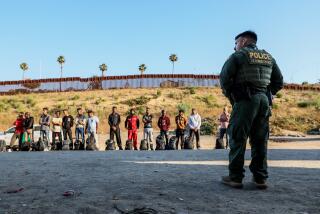How Victor and Other Small Children Fell by the Wayside
Some who journey north are very young.
Victor Flores, 4 years old, maybe 5, was abandoned on a bus by a female smuggler. He carries no identification, no telephone number.
He ends up at Casa Pamar, a foster home in Tapachula, Mexico, just north of the Guatemalan border. The home shelters immigrant children whom authorities find abandoned in airports, bus stations and on the streets. It broadcasts their pictures on Central American television so family members might rescue them.
The boy gives his name to Sara Isela Hernandez Herrera, a coordinator at the home, but says he does not know how old he is or where he is from. He says his mother has gone to the United States. He holds Hernandez’s hand with all his might and will not leave her side. He asks for hugs. Within hours, he begins calling her Mama.
When she leaves work every afternoon, he pleads, in a tiny voice, for her to stay--or at least to take him with her.
She gives him a jar of strawberry marmalade and strokes his hair.
“I have a family,” he says, sadly. “They are far away.”
Dennis Ivan Contreras, 12, is from San Pedro Sula, Honduras, and hoping to reach his mother in San Diego. He is like many of the younger kids on the journey: fearlessly reckless.
Being brave and small can help. Begging, for instance, is easier, more successful. To Dennis, riding a freight train is like playing on a jungle gym. Dodging authorities is like a game of cops and robbers.
As his train pulls out of Mapastepec, Mexico, he teaches Jose Padilla Guerra, 13, a Honduran trying to find his mother in New York, how to leap between the moving cars. Dennis steps back for a running start. Then he sprints. Raising his arms like a bird spreading its wings, he pushes off the end of one of the cars.
He spreads his tiny legs. He flies four feet and lands. Then he kneels, patting the spot where Jose should land too.
The train shakes.
“Don’t look down,” Dennis says. “Never look down. Only look to where your foot must land. Just look here. Nowhere else.”
Jose, a gangly, chatty boy, is too scared.
“Now,” Dennis says. “Jump! Jump! It’s OK. Stand back and run.”
“Wait till it stops shaking so much,” Jose says.
The train slows, then creeps to a stop. Now Jose launches, landing easily.
Dennis laughs.
Francisco Gaspar, 12, from Concepcion Huixtla in Guatemala, is terrified. He sits in a hallway at a Mexican immigration holding tank in Tapachula.
With a corner of his Charlie Brown T-shirt, he dabs at tears running down his chin. He is waiting to be deported. His smuggler left him behind at Tepic, in the western coastal state of Nayarit. “He didn’t see that I hadn’t gotten on the train,” Francisco says, between sobs. His short legs kept him from scrambling aboard.
Immigration agents caught him and bused him to Tapachula.
Francisco left Guatemala after his parents died. He pulls a tiny scrap of paper from a pants pocket with the telephone number of his Uncle Marcos in Florida. “I was going to the U.S. to harvest chiles,” he says. “Please help me! Please help me!”
Clutching a handmade cross of plastic beads on a string around his neck, he leaves his chair and moves frantically from one stranger to another in the hallway. His tiny chest heaves. His face contorts in agony. He is crying so hard that he struggles for breath.
He asks each of the other immigrants to help him get back to his smuggler in Tepic. He touches their hands. “Please take me back to Tepic! Please! Please!”
More to Read
Sign up for Essential California
The most important California stories and recommendations in your inbox every morning.
You may occasionally receive promotional content from the Los Angeles Times.










